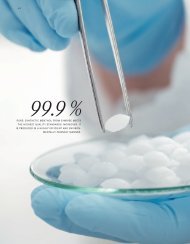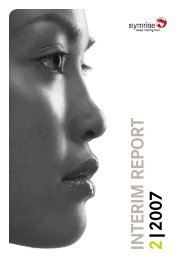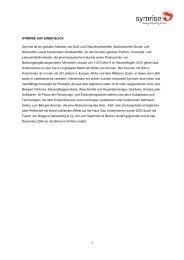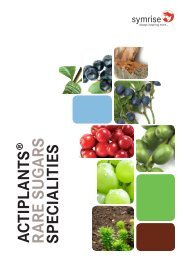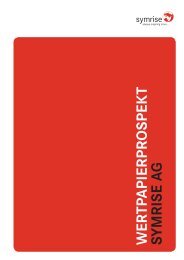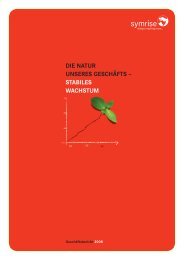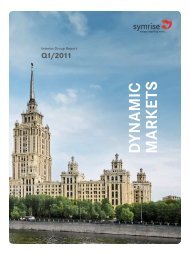THE NATURE OF OUR BUSINESS – STABLE GROWTH - Symrise
THE NATURE OF OUR BUSINESS – STABLE GROWTH - Symrise
THE NATURE OF OUR BUSINESS – STABLE GROWTH - Symrise
Create successful ePaper yourself
Turn your PDF publications into a flip-book with our unique Google optimized e-Paper software.
Customer complaints about product quality are always possible.<br />
We prepare for such risks by applying strict quality control measures<br />
as well as through insurance policies.<br />
<strong>Symrise</strong> is always exposed to issues if customers change their<br />
technology of integrating our products into further operations.<br />
This issue is countered by increased efforts to merchandise current<br />
products in different markets and by highlighting the advantages<br />
of current products.<br />
Political events might result in trade embargos to relevant export<br />
countries and therefore interrupt our product deliveries. At the<br />
same time, payments of outstanding debts could be stopped due<br />
to bank boycotts. We counter this risk by maintaining a constant dialogue<br />
with customers and banks, closely observing the development<br />
of political events and continuously optimizing our working<br />
capital. Besides this, the current financial crisis in export countries<br />
may also lead to payment interruption. Here we improve financial<br />
control and adjust payment procedures wherever possible.<br />
In the current critical financial environment there is also the<br />
risk that customers may reduce their inventory levels in order to<br />
optimize their working capital. Depending on the extent and duration<br />
of this destocking, it can have a significant impact on the entire<br />
supply chain. A prolonged recession in the global economy<br />
can also influence the type of products that customers order. This<br />
in turn can impact the growth of the F&F market. Nevertheless,<br />
we feel that we are able to adapt quickly and successfully to such<br />
changes.<br />
Operational and IT Risks<br />
Production continuity at some of our manufacturing facilities could<br />
be adversely affected in the event of technical failure. Regular<br />
tests, maintenance programs, modernization and targeted investments<br />
are designed to counter this risk.<br />
Also, stricter country-specific environmental regulations may<br />
challenge our ability to comply with the law at all times and result<br />
in fines or even shutdowns of our local facilities. Similarly, risks related<br />
to the storage and handling of raw materials and products<br />
may cause damage to assets (e.g. fire) or even personal injuries.<br />
Equipment to improve safety or environmental conditions is regularly<br />
evaluated and upgraded when necessary. Site security<br />
workshops, comprehensive guidelines, supporting systems, management<br />
reports and audits contribute to the management and<br />
mitigation of these risks.<br />
Annual Report 2008 <strong>Symrise</strong> AG 85<br />
Moreover, <strong>Symrise</strong> aims not only to adhere to regulations but also<br />
proactively takes care of matters that could negatively impact its<br />
neighbors (e.g. noise, odor). <strong>Symrise</strong>’s regulatory team closely follows<br />
the latest regulations and makes sure compliance is maintained.<br />
For example, some time ago the company dedicated<br />
resources and rolled out several projects to coordinate activities<br />
required to comply with the European REACH regulation (Registration,<br />
Evaluation and Authorization of Chemicals).<br />
The integration of new businesses and affiliates into the <strong>Symrise</strong><br />
world also gives rise to supply chain and production issues.<br />
Business acquisitions, supported by toll manufacturing as an interim<br />
solution, will be followed by issues of material and formula<br />
harmonization. The integration of new operations into the existing<br />
setup of facilities might lead to interruptions because of production<br />
transfer and to breakdowns as a result of over-utilization.<br />
These risks are mitigated by Total Productive Maintenance (TPM)<br />
measures, contingency plans and possible fall-backs, the exchange<br />
of best practices, and ongoing operational improvements.<br />
<strong>Symrise</strong> uses different telecommunications and IT systems to run<br />
its business.<br />
In addition to technical precautions already in place, security enhancements<br />
and system updates are constantly being implemented<br />
to counter potential risks that could disrupt their<br />
functioning or stability. A common IT system is currently being<br />
rolled out, and outdated communication technology will soon be<br />
replaced. The IT services are supplied by an external party that<br />
has significant resources and the global expertise to manage any<br />
potential crisis.<br />
Procurement Risks<br />
Procurement is an essential activity at <strong>Symrise</strong>. In its daily business,<br />
the company deals with a complex and very large portfolio<br />
of raw materials, both natural and of petrochemical origin. On the<br />
one hand, it seeks quality and reliability; on the other, it seeks low<br />
prices. This constellation involves several risks, which are described<br />
in more detail below.<br />
Unexpected increases in energy and petrochemical commodities<br />
prices that could negatively impact the costs of goods are mitigated<br />
by means of dynamic and intelligent sourcing strategies.<br />
Market or weather conditions may result in highly volatile prices for<br />
some important raw materials and can also have a negative impact<br />
on their quality and availability. Besides negotiating long-term<br />
global contracts and having alternative suppliers whenever feasi-<br />
Group Management<br />
Report



